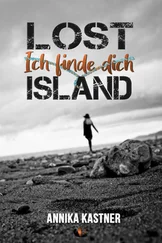
Annika Thor
A Faraway Island
Translation copyright © 2009 by Linda Schenck

*

*
The train slows to a halt. A voice over a loudspeaker shouts in an unknown language.
Stephie presses her nose to the window. Through the steam from the locomotive, she sees a sign and, farther down, a brick building with a glass roof.
“Are we there, Stephie?” Nellie asks anxiously. “Is this where we get off?”
“I’m not sure,” Stephie answers, “but I think so.”
She stands up on the seat to reach the luggage rack, lifting Nellie’s suitcase down first, then her own. Their school knapsacks are on the floor at their feet. They must be sure not to leave anything on the train. This is all they were allowed to bring with them, and it is very little indeed.
A lady in a summer suit and hat appears in the doorway of their compartment. She addresses them in German.
“Hurry, hurry,” she says. “This is Göteborg. Our destination.”
The lady moves along to the next compartment without waiting for an answer.
Stephie pulls on her own knapsack, then helps her sister. “Take your suitcase!” she says.
“It’s so heavy,” Nellie complains, lifting it anyway. Hand in hand, they walk out into the train corridor. There are already a number of children gathered, all eager to disembark.
Soon the station platform is crowded with children and luggage. Behind them, the train pulls away, thudding and squealing. Some of the smaller children are crying. One little boy is calling for his mamma.
“Your mamma’s not here,” Stephie tells him. “She can’t come to you. But you’ll be getting a new mother here, one who’s just as nice.”
“Mamma, mamma,” the little boy wails. The lady in the summer suit lifts him up and carries him.
“Come along,” she says to the other children. “Follow me.”
They walk behind her in a line like ducklings and enter the station, the building with the high, arched glass roof. A man with a big camera moves toward them. The sudden flash is blinding. One of the smaller children screams.
“Stop it, mister,” the lady escorting them says curtly. “You’re frightening the young ones.”
The man goes on taking pictures anyway.
“This is my job, lady,” he says. “Yours is to look after the poor little refugee children. Mine is to take the heartbreaking pictures so you’ll get more money to do your work.”
He takes a few more shots.
Stephie turns her face away. She doesn’t want to be a refugee child in a heartbreaking picture in some magazine. She doesn’t want to be someone people have to give money for.
The lady leads them to the far end of a large waiting area, part of which has been cordoned off and is full of grown-ups. An older woman with glasses moves toward them.
“Welcome to Sweden,” she says. “We are so glad you got here safely. We represent the local relief committee. You’ll be safe here until you can be reunited with your parents.”
This lady speaks German, too, but with a funny accent.
A younger woman takes out a list and begins calling names: “Ruth Baumann… Stephan Fischer… Eva Goldberg…”
Every time she calls a name, a child raises his or her hand, then walks over to the lady with the list. The lady double-checks the name against the brown name tags that the child, like all the other children, has hanging from his or her neck. One of the adults who’ve been waiting steps forward, takes the child, and departs. The children who are too small to respond to the roll call are pointed out and collected from their bench.
The list is in alphabetical order, so Stephie realizes she and Nellie will have a long wait. Her stomach is aching with hunger, and her whole body longs for a bed to stretch out on. The crowded railway compartment has been their home since early yesterday morning. The miles and miles of track have carried them all the way from Vienna, Austria, far from Mamma and Papa. The rails were a link between them. Now the girls have been cut off. They’re all alone.
Slowly the groups of children and adults begin to dwindle. Nellie cuddles up to Stephie.
“When will it be our turn, Stephie? Isn’t there anybody here for us?”
“They haven’t come to S yet,” Stephie explains. “We have to wait.”
“I’m so hungry,” Nellie whines. “And so tired. And so very hungry.”
“There’s nothing left to eat,” Stephie informs her. “We finished our sandwiches ages ago. You’ll have to be patient until we get to where we’re going. Sit down on your suitcase if you’re too tired to stand.”
Nellie sits down on her little case, chin in hands. Her long black braids reach nearly to the floor.
“Nellie, I’ll bet we’re going to be living in a real palace,” Stephie says, trying to comfort her sister. “With zillions of rooms. And a view of the sea.”
“Will I have my own bedroom?” Nellie asks.
“Sure,” Stephie promises.
“Oh, no,” Nellie moans. “I’d rather share with you.”
“Eleonore Steiner,” Stephie hears the lady call out.
“That’s you! Say ‘Here,’” Stephie whispers.
“Eleonore Steiner,” the lady with the list repeats. “Come forward!”
Stephie pulls Nellie along, zigzagging between pieces of luggage. “We’re here,” she says.
The lady looks back down at her list. “Stephanie Steiner?” she asks.
Stephie nods.
“Steiner,” the lady repeats loudly. “Eleonore and Stephanie Steiner!”
No grown-up comes forward.
“Stephie,” asks Nellie, her voice trembling, “doesn’t anybody want us?”
Stephie doesn’t answer, just clutches Nellie’s hand tightly. The lady with the list turns to her.
“You’ll have to wait a bit longer,” she says, moving the two sisters to the side. “If you’ll just stand here, I’ll be back shortly.”
The older woman takes over the roll call. After a while, all the other children are gone. Stephie and Nellie are alone with their suitcases.
“Can we go home now?” asks Nellie. “Back to Mamma and Papa?”
Stephie shakes her head. Nellie begins to cry.
“Shhh,” Stephie hisses. “Don’t start blubbering, now. You’re not a crybaby, are you?”
Heels clatter against the marble floor. Footsteps approach. The younger woman quickly explains something to the older one. She takes a pen out of her bag and writes on Stephie and Nellie’s name tags: These children do not speak Swedish.
“Come along,” she says to Stephie. “I’m going to take you to the boat.”
Stephie takes her suitcase in one hand and Nellie by the other. Silently, they follow the lady out of the station.
The sun is bright, the August heat oppressive, as Stephie, Nellie, and the lady from the relief committee clamber into a taxicab outside the train station. Stephie is all itchy inside her heavy new coat. Before they left for Sweden, their mother had a winter coat made for each of them by Fräulein Gerlach, the seamstress. Mamma asked Fräulein Gerlach for especially thick linings; she knew Sweden was a cold country.
Читать дальше














